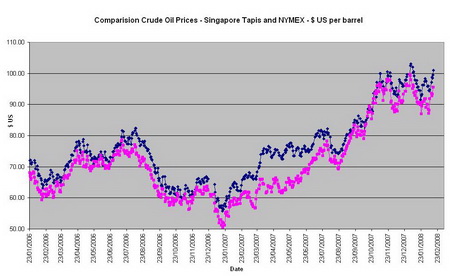Oil breaks $100, hits new all-time high
Posted by Big Gav on February 19, 2008 - 11:28pm in The Oil Drum: Australia/New Zealand
Sydney Morning Herald: Tapis and WTI both over $100 a barrel now.

Rex from ASPO Sydney provided this chart and the following edited comments:
This time a year ago Tapis opened up a price lead over WTI that lasted about 5 months. They then tracked closer together up to the first $100 price spike late last year. Since then they have been on their own 'bumpy plateau'.
It appears the Tapis/WTI price gap is opening up again in 2008. Although it's early days and with much higher prices than 12 months ago, it will be worth watching.
The price plateau that both WTI & Tapis have reached I suspect will be tested in an upward direction over the next few months as demand pushes available supply and maybe a new price spike will emerge in the months to come?
I think price differentials between Tapis/WTI are mainly geographical in nature, with strong Asian demand, and possibly some particular local constraints on demand for WTI with refineries in turn-around season? Since Rex produced the chart, WTI has closed the gap substantially.
Clearly, with both indicators touching above $100 at least temporarily, the US recession is not hurting oil demand appreciably yet.




They're not calling it a "recession" in the US just yet; or rather they're saying they might get one, but not just yet. I'm not sure exactly what the time frame is supposed to be - could you come to your office from lunch and the recession started? Back from a weekend away? After a month? Or what? How long does it take to happen, and how long must we have bad news before we say we're in a "recession"?
The demand for oil is considerably higher than production, so even with a US recession oil prices will continue to rise. $180 a barrel before the end of the year, I say ;) Rather than high oil prices happening despite the US recession, I reckon we'll see the US recession made certain by high oil prices.
Edit: oh, and the reason Tapis is more than WTI is that in the last year or two the US has had a lot of problems with its refineries. So they couldn't guarantee supply. Obviously if you're buying futures then you're not so keen on ones with... well, less of a future.
That post was a joint effort from Phil and I - I wouldn't technically class the US as being in recession (yet).
I think the official definition is negative growth for 2 consecutive quarters.
I don't understand your comment about WTI and refineries. Do you mean that WTI sells for less because the demand (from US refineries) has been lower than expected ? I thought it was partly a quality issue - Tapis is lighter / sweeter than WTI...
Tapis is slightly lighter and sweeter than WTI, but that's not most of the price difference we've been seeing.
It's simply that with several US refineries down, there's been less West Texas Intermediate actually on the market. The Texan oil producers send their crude to those US refineries - but they couldn't refine it so it just stayed in the ground for a bit, Texan production was down. Some gets sent overseas for refining, but the transport of it adds to the costs. When this was going to change was not perfectly knowable, you never know with big machines like refineries. So the future ability of WTI producers to be able to have their stuff refined and turned into something actually useful (unlike crude itself) was uncertain. Thus the futures sold for less.
Whereas Tapis has kept flowing into and out of the various refineries - including one at Geelong where a mate of mine works.
While the price of oil has been on a sort of plateau, if you compare oil against the any of the stock market indicies, eg. All Ords:
http://stockcharts.com/h-sc/ui?s=$WTIC:$AORD&p=D&yr=1&mn=3&dy=0&id=p69466569828
You can see that a steady trend has been continuing for over a year. Without trying to interpret markets it seems to me that there is a definite trend going on where production (company values) vs. oil/energy price is being seriously adjusted to a different level. So I won't be surprised to see either oil to keep rising and/or stock markets to continue downwards (in relative terms) for some time, regardless of any talk of recession, subprime or credit crunch. In other words if you are hoping a recession might ease oil prices then expect markets to fall faster.
Europe, US:
http://stockcharts.com/h-sc/ui?s=$WTIC:$EUR&p=D&yr=1&mn=3&dy=0&id=p69466569828
http://stockcharts.com/h-sc/ui?s=$WTIC:$DJUS&p=D&yr=1&mn=3&dy=0&id=p69466569828